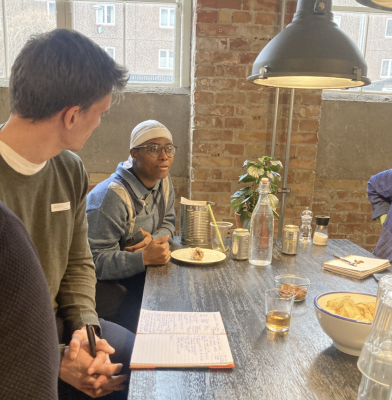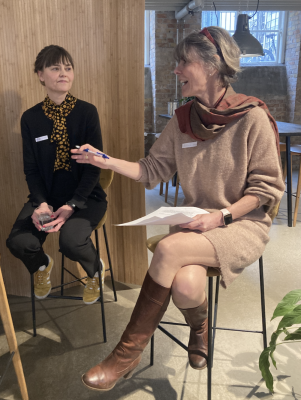World Tuberculosis (TB) Day, observed annually on March 24th, holds significant importance in the global health calendar, serving as a vital opportunity to raise public awareness about tuberculosis, a potentially deadly infectious disease that primarily affects the lungs.
At the “Unpacking Tuberculosis: A Global Issue” event, THINK Denmark brought together influential voices to discuss tackling TB and its cross-cutting issues. Our esteemed panel, featuring experts Rikke Nagell from AIDS-Foundation, Dr. Troels Lillebæk from University of Copenhagen and Statens Serum Institute (SSI), and Michael Aastrup Jensen from Folketinget, shed light on the urgent need for collaborative global action.
Today, the significance of World TB Day extends beyond the remembrance of scientific achievements. It acts as a crucial platform for educating people about the impact of TB, which remains one of the world’s leading infectious killers, globally. Despite being preventable and curable, TB continues to cause significant morbidity and mortality globally, particularly in low- and middle-income countries where access to healthcare services may be limited.
 In line with World TB Day, THINK’s event in Copenhagen aimed to connect the dots between the political, social, and financial commitments from governments, donor agencies, non-governmental organisations, healthcare providers, and communities towards the fight against TB. It emphasised the need for ongoing funding, research, and development in TB diagnostics, treatment, and vaccines, aiming to accelerate progress towards the World Health Organization’s (WHO) End TB Strategy goals, including a drastic reduction in TB deaths and cases by 2030.
In line with World TB Day, THINK’s event in Copenhagen aimed to connect the dots between the political, social, and financial commitments from governments, donor agencies, non-governmental organisations, healthcare providers, and communities towards the fight against TB. It emphasised the need for ongoing funding, research, and development in TB diagnostics, treatment, and vaccines, aiming to accelerate progress towards the World Health Organization’s (WHO) End TB Strategy goals, including a drastic reduction in TB deaths and cases by 2030.
The event highlighted that the global TB challenge is complex and deeply intertwined with broader health, socio-economic, and political issues. At the heart of the problem lies a lack of funding and resources attributed to ending TB. Although significant strides have been made to reduce the treatment period of TB, as well as diagnosing TB more effectively with innovative technology like Artificial Intelligence (AI), the Global Plan to End TB 2023-2030 estimates that $250 billion dollars is needed to end TB by 2030. Lack of funding significantly impacts the distribution of health resources and the global response to end TB, particularly affecting developing countries where TB is most prevalent.
In facing these challenges, a global effort is needed to combat TB. Michael Aastrup Jensen from the Danish Liberal Party (Venstre) emphasised the importance of collaborative international efforts and pooling resources to combat such global health issues. By uniting world leaders, communities, civil society, health workers, and the private sector, such initiatives can implement solutions that significantly impact health outcomes and work towards eradicating diseases like TB. Rikke Nagell added further nuance to this discussion by underscoring TB’s comorbidity with other health issues such as HIV and AIDS, thus shedding light on the need to fill in gaps between TB and other health issues. We cannot treat such issues in silos, and thus need further collaboration to tackle such intersecting comorbidities.
 The goal to end TB by 2030 is ambitious, but within our reach if we harness the power of collective action and innovation. Every effort counts, from advocating for increased funding and research to implementing effective public health measures and supporting those affected by TB in our communities. As Dr. Troels Lillebæk emphasised at the event, TB is a pressing global concern, affecting a quarter of the world’s population. Dr Lillebæk reminds us that TB knows no borders and affects everyone indiscriminately, especially marginalised and vulnerable communities, even in highly developed countries like Denmark. Therefore, it’s about more than just medical treatment; it’s about building global and local infrastructures of care and support that leaves no one behind, so people are not just treated, but cured in the most effective way possible.
The goal to end TB by 2030 is ambitious, but within our reach if we harness the power of collective action and innovation. Every effort counts, from advocating for increased funding and research to implementing effective public health measures and supporting those affected by TB in our communities. As Dr. Troels Lillebæk emphasised at the event, TB is a pressing global concern, affecting a quarter of the world’s population. Dr Lillebæk reminds us that TB knows no borders and affects everyone indiscriminately, especially marginalised and vulnerable communities, even in highly developed countries like Denmark. Therefore, it’s about more than just medical treatment; it’s about building global and local infrastructures of care and support that leaves no one behind, so people are not just treated, but cured in the most effective way possible.
Addressing the global TB epidemic requires a multifaceted approach that goes beyond medical solutions to tackle the underlying socio-economic and political determinants. It calls for a collaborative and aligned effort from all stakeholders, including governments, NGOs, the private sector, and affected communities, to foster a more equitable world where health is recognised as a fundamental human right. Let us turn the tide against TB because, together, we can make the dream of a TB-free world a reality by 2030. Together, we are stronger. Together, we can end TB because health is a human right.
